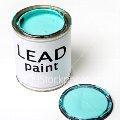This is the VOA Special English Development Report.
A new study shows that lead-based paint remains a worldwide threat to public health. Paint containing lead is a major cause of lead poisoning in children.
The heavy metal enters the body when children breathe the paint dust or fumes in the air. Or when babies put their mouth on painted surfaces or swallow pieces of paint.
Lead can damage the brain and the nervous system. It can decrease intelligence, create behavior problems and slow a child's growth. Researchers tested new household enamel paints from twelve countries in Africa, Asia and South America. The paints were sold under different brand names. The study found that almost three-fourths of the brands had dangerously high levels of lead.
Scott Clark is a professor of environmental health at the University of Cincinnati College of Medicine in Ohio.
SCOTT CLARK: "Most of the paint brands that we looked at had at least one sample that was above ten thousand parts per million, which is over a hundred times the current U.S. standard." The United States has restricted lead content in paint since nineteen seventy-eight. Until this past month, the safety standard for consumer paints was six hundred parts per million. But the Consumer Product Safety Commission has just lowered the limit to ninety parts per million.
The new study appears in the journal Environmental Research. The team found levels of lead as high as thirty-two thousand parts per million in tests on some paint samples from Ecuador.
Professor Clark's team also published a study in two thousand six. It found that the majority of new enamel paints from China, India and Malaysia contained lead at levels of at least five thousand parts per million.
Lead paint can be a danger not only to people in the country where it is made. Exports can spread the danger to other countries.
The professor says high quality paint can be produced without lead. He and his team are calling for a worldwide ban on lead-based paint. He says many parts of the world are doing too little to correct the problem of lead poisoning in children. He notes that research has found no safe level of lead.
Of course, lead paint is not the only cause of lead poisoning. Recently Chinese officials closed a manganese metal factory in Hunan province. More than one thousand children living nearby were reported to have high levels of lead in their blood. And in two thousand eight, seventeen people died in Senegal after lead exposure from a battery recycling center.
And that's the VOA Special English Development Report, written by June Simms. I'm Steve Ember.

